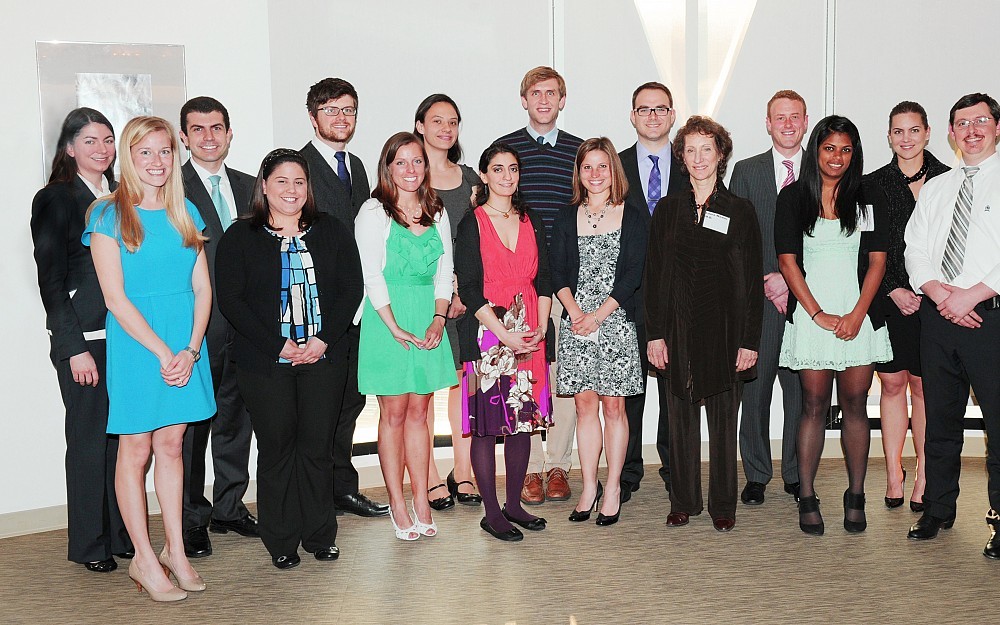
In Preparation for the Hardest Year, Medical Students Pass On Advice
Before they graduated from the College of Medicine this spring, a group of UC students sat down to pass on their most important gift: their reflections and advice on the third year of medical school.
Their publication, "Letters to Third Year Students was distributed to the Class of 2015 at the student clinician ceremony Friday, June 28. It was also the service project for the Gold Humanism Honor Society (GHHS) Class of 2013.
GHHS advisor and assistant dean of academic support Laura Malosh, PhD, says the third year is generally considered the most challenging year of medical school, as students begin spending most of their time in clinical rotations.
"One of the main goals of the book was to help rising third-year students know what to expect and to provide some guidance for navigating this new territory, she says.
Joe Kohne, MD, GHHS member and now a pediatrics resident at Cincinnati Children's Hospital Medical Center, says he recalls getting valuable advice from other medical studentson how to prepare for shelf exams, which review books to buy and which attending physicians to seek out.
"We wanted to help pass on other lessons and advice we learned during medical school: how to make a difference for your patient as a student, how to deal with those really awful days on the wards, and give some insight into what other students around you may be thinking or feeling, he says.
To solicit letters, GHHS members emailed their classmates, posted fliers and asked their friends directly. In addition, each honor society member wrote their own letter of advice.
"I think that we felt this book would be helpful--and even necessary--to most rising third years, says GHHS member Leila Hojat, MD. "Medical students in general aren't prepared well for the emotional ups and downs of third year.
Hojat, now a medicine-pediatrics resident at Case Western/MetroHealth Medical Center, says students excitement at their third year can quickly be crushed by the day-to-day of clinical care.
"We wanted to encourage these students as much as possible while still preparing them for the reality of the wards, she says. "The goal then was to keep their spirits positive and prevent them from losing hope when they did meet difficult or disheartening situations.
"I personally think the students did a phenomenal job, says Malosh. "Their letters are balanced, authentic and honest. For many of the graduating students, the project also helped them reflect on and process their own experience and journey through medical school.
Related Stories
Ohio could soon make breast cancer screenings more affordable
May 9, 2025
The University of Cincinnati Cancer Center's Ann Brown was featured in Local 12 and Cincinnati Enquirer reports on a bill introduced by Rep. Jean Schmidt in the Ohio legislature that seeks to eliminate out of pocket medical expenses such as copays and deductibles associated with supplemental breast cancer screenings.
Preparing students for artificial intelligence in education
May 8, 2025
Laurah Turner, PhD, associate dean for artificial intelligence and educational informatics at the University of Cincinnati's College of Medicine, recently joined the For The Love of EdTech podcast to discuss the usage of personalized learning and AI coaches to enhance educational experiences.
UC lab-on-a-chip devices take public health into home
May 8, 2025
University of Cincinnati engineers created a new device to help doctors diagnose depression and anxiety. The “lab-on-a-chip” device measures the stress hormone cortisol from a patient’s saliva. Knowing if a patient has elevated stress hormones can provide useful diagnostic information even if patients do not report feelings of anxiety, stress or depression in a standard mental health questionnaire.
